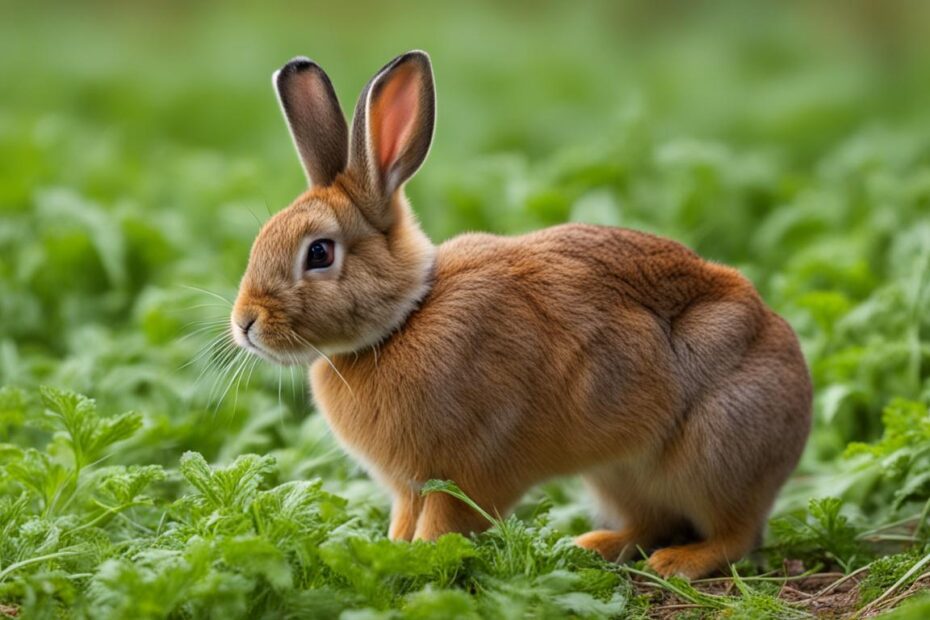Rabbits and carrots have a long-standing association, with countless images and stories depicting these furry creatures munching happily on crunchy orange carrots. But is this portrayal accurate? Are carrots truly a rabbit’s favorite treat? In this blog post, we will explore the myths and facts surrounding rabbits and carrots, shedding light on their nutritional needs and feeding habits.
Key Takeaways:
- Rabbits can eat carrots but in moderation.
- A balanced diet for rabbits consists of hay, water, and pellets, with vegetables as supplementary treats.
- Carrots should not be the primary food for rabbits, as they are high in sugar.
- Carrot greens are a healthier alternative to carrots, containing fewer sugars and more nutrients.
- When introducing carrots or any new food to a rabbit’s diet, it is essential to do so gradually.
Can Rabbits Eat Carrots?
The short answer is yes, rabbits can eat carrots. Carrots are not toxic to rabbits and can be a part of their balanced diet. In the wild, rabbits consume various vegetables, including carrot tops and other root vegetables. However, it is crucial to remember that carrots should only be fed in moderation.
Benefits of Carrots for Rabbits
Carrots contain essential vitamins and minerals that can benefit a rabbit’s health. They are rich in beta-carotene, which gets converted into vitamin A in their bodies. Vitamin A plays a crucial role in maintaining good eyesight and a healthy immune system for rabbits.
Additionally, carrots offer a natural source of hydration due to their high water content, which can contribute to a rabbit’s overall fluid intake. The crunchy texture also helps promote dental health by wearing down their teeth, which continuously grow throughout their lives.
However, while carrots have their benefits, it’s essential to exercise caution when including them in your rabbit’s diet.
Carrots as Occasional Treats
Carrots should be seen as occasional treats rather than a staple food in a rabbit’s daily diet. While they are a nutritious option, they are also high in sugar and should be given in moderation. Feeding excessive amounts of carrots can lead to weight gain, digestive issues such as bloating and diarrhea, and an imbalanced diet.
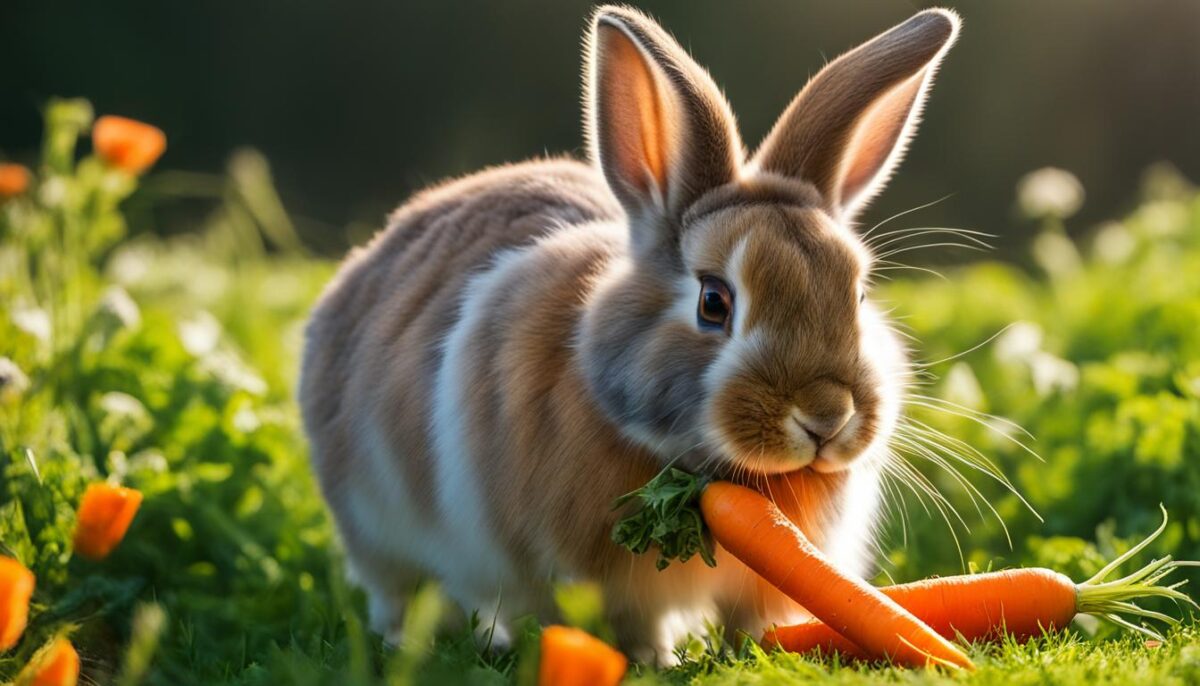
- Provide carrots as small, bite-sized pieces to prevent choking hazards.
- Introduce carrots gradually to observe how your rabbit’s digestive system reacts.
- Monitor your rabbit’s weight regularly and adjust their diet accordingly.
Remember, a balanced diet for rabbits primarily consists of good quality hay, fresh water, and high-fiber rabbit pellets. Carrots should complement their diet as an occasional treat rather than a primary food source.
| Carrot Nutrition Facts | Amount per 100g |
|---|---|
| Calories | 41 |
| Protein | 0.9g |
| Fat | 0.2g |
| Carbohydrates | 9.6g |
| Fiber | 2.8g |
| Vitamin A | 835μg |
| Vitamin C | 5.9mg |
Table: Nutritional information for 100g of carrots.
The Myth of Carrots as the Primary Food
Contrary to popular belief, carrots should not be the primary food for rabbits. While carrots are safe for rabbits to eat, they should only be given in moderation as occasional treats. A well-balanced diet for a pet rabbit consists mainly of three key components: good quality hay, fresh water, and high-fiber rabbit pellets.
Hay is an essential part of a rabbit’s diet. It provides them with the necessary fiber that aids in proper digestion and promotes good dental health. Rabbits have a unique digestive system that requires a high-fiber diet to prevent issues such as gastrointestinal stasis, which can be life-threatening.
Water is another crucial element in a rabbit’s diet. Clean, fresh water should always be available for your furry friend. Make sure to regularly change the water and provide it in a clean bowl or bottle that is easily accessible for your rabbit.
Rabbit pellets are formulated specifically to meet a rabbit’s nutritional needs. These pellets typically contain a balance of essential nutrients and vitamins that are beneficial for your rabbit’s health. However, it is important to choose high-fiber pellets and avoid those with added sugars or unhealthy fillers.
Offering a variety of fresh rabbit-safe vegetables and herbs in small quantities is also recommended. Leafy greens like kale, romaine lettuce, and cilantro can be included in their diet to provide additional nutrients. It’s important to introduce new vegetables gradually and monitor your rabbit’s response to ensure they tolerate them well.
Remember, rabbits have specific nutritional requirements, and their diet should not solely consist of carrots. Providing a well-balanced diet, including hay, water, high-fiber pellets, and occasional carrot treats, will help keep your rabbit happy, healthy, and thriving.
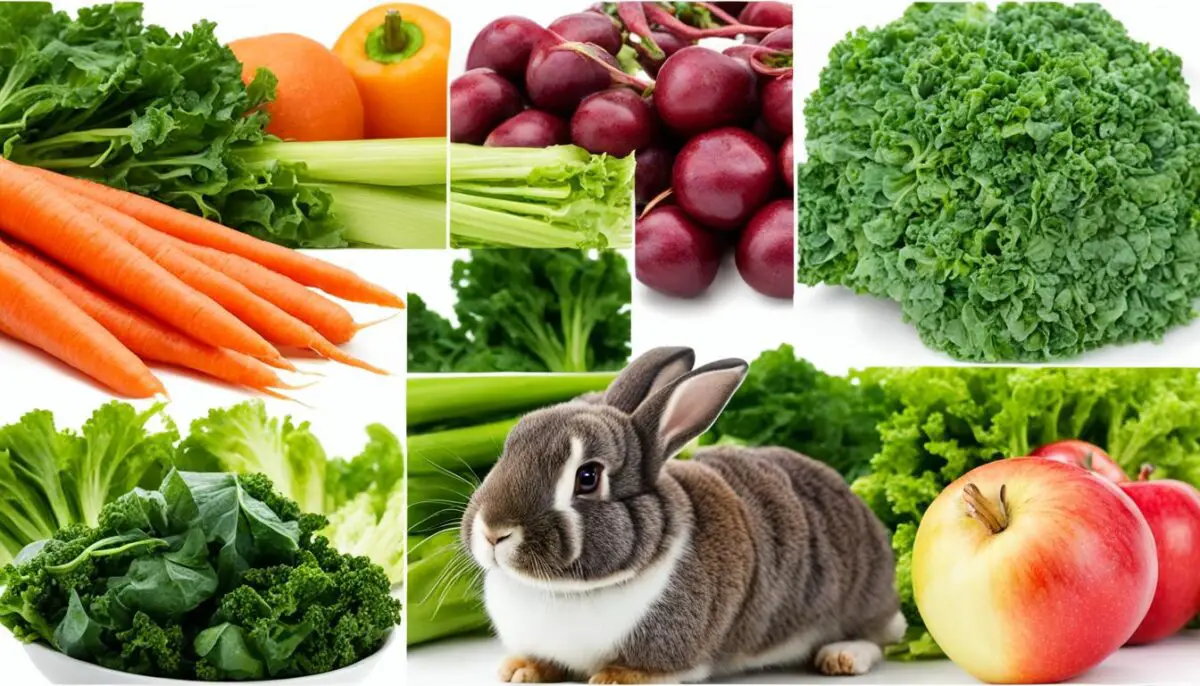
Rabbit Feeding Do’s and Don’ts:
- Do: Provide unlimited fresh hay for your rabbit to chew on and aid in digestion.
- Do: Offer a variety of rabbit-safe vegetables and herbs in small quantities.
- Do: Choose high-quality, high-fiber rabbit pellets without added sugars or unhealthy fillers.
- Don’t: Feed your rabbit excessive amounts of carrots, as they are high in sugar and can lead to health issues.
- Don’t: Introduce new foods to your rabbit’s diet abruptly; instead, do it gradually.
- Don’t: Neglect the importance of fresh, clean water for your rabbit’s hydration.
Moderation is Key
While carrots are safe for rabbits, it’s important to remember that moderation is key when it comes to including them in your furry friend’s diet. Carrots are high in sugar and should be given as occasional treats rather than a staple food.
The sugar content in carrots can have negative effects on a rabbit’s health if consumed in large amounts. Feeding excessive carrots can lead to weight gain, obesity, and other health issues, including gastrointestinal problems. The delicate balance of a rabbit’s digestive system can be disrupted by the excess sugar, causing bloating or diarrhea.
Therefore, it’s essential to limit the amount of carrots you offer to your rabbits. Instead, focus on providing a well-rounded and healthy diet that consists mainly of high-quality hay, fresh water, and nutrient-rich rabbit pellets.
By offering a diverse range of foods and maintaining moderation with treats like carrots, you can ensure that your rabbits receive the nutrition they need for optimal health and well-being.
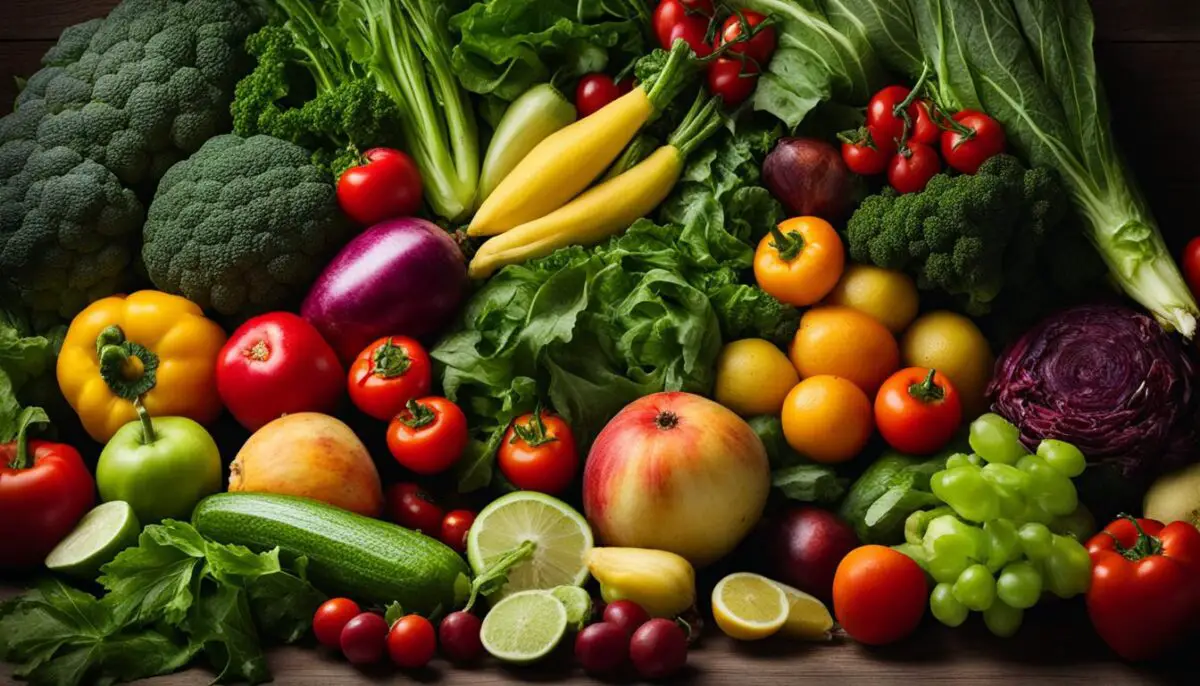
Benefits of a Healthy Diet for Rabbits
“Feeding rabbits a balanced and nutritious diet not only promotes their overall well-being but also helps prevent health issues and ensures a longer lifespan.”
Rabbits, like any other living creatures, require a healthy diet to thrive. A well-balanced diet provides essential nutrients, supports proper growth and development, enhances their immune system, and improves their overall quality of life.
Here are some key benefits of a healthy diet for rabbits:
- Improved Digestion: A diet that includes a variety of high-fiber foods helps maintain a healthy gut, prevents digestive problems, and reduces the risk of gastrointestinal stasis.
- Strong Teeth: Chewing on hay and fibrous foods promotes dental health by wearing down their continuously growing teeth, preventing dental malocclusion, and reducing the need for dental interventions.
- Healthy Weight: A balanced diet with appropriate portion sizes helps maintain a healthy weight, preventing obesity and related issues.
- Prevention of Malnutrition: Providing a diverse range of fruits, vegetables, and hay ensures that rabbits receive all the necessary vitamins, minerals, and nutrients for their well-being, preventing malnutrition.
- Enhanced Immune System: Nutrient-rich foods, especially those high in vitamin C, antioxidants, and fiber, contribute to a strong immune system, protecting rabbits from various illnesses.
Remember, a healthy diet should always be complemented by regular veterinary check-ups, exercise, mental stimulation, and plenty of love and attention.
Recommended Rabbit Treats
While carrots should be given in moderation, there are other options to treat your rabbits with. Here are a few healthy and safe alternatives:
| Treat | Description |
|---|---|
| Fresh Leafy Greens | Offer a variety of leafy greens, such as kale, parsley, cilantro, or romaine lettuce, to provide additional vitamins and minerals. |
| Small Fruit Pieces | Occasionally offer small amounts of fruit like apple slices or berries as a special treat due to their higher sugar content. |
| Herbs | Certain herbs like basil, mint, or dill can be added to their diet for both additional flavors and health benefits. |
| Hay Cubes | Hay cubes can serve as a healthy and satisfying treat, promoting dental health and providing additional fiber. |
By offering a variety of treats in moderation, you can keep your rabbits happy and satisfied while ensuring their overall well-being.
Carrot Greens: A Better Option?
If you’re looking for an alternative to feeding large quantities of carrots, consider offering carrot greens instead. Carrot tops are low in sugar and rich in nutrients, making them a healthier option for your furry friend. However, just like carrots, carrot greens should be given in moderation.
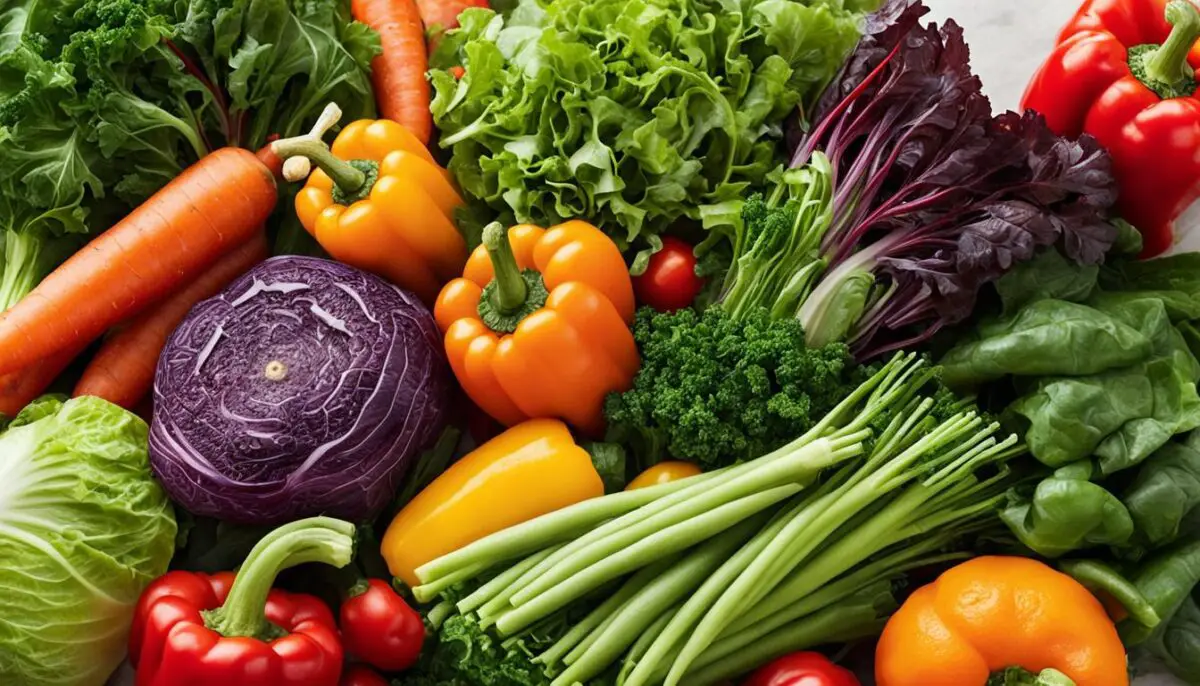
Carrot greens, also known as carrot tops, are the green leafy part of the carrot plant that grows above the ground. While most people discard carrot greens, they can actually provide valuable nutrition for your rabbit.
The greens of the carrot plant contain essential vitamins and minerals that can support your rabbit’s overall health. They are packed with fiber, which helps keep their digestive system running smoothly. In addition, carrot greens are a good source of vitamin A, vitamin K, and calcium.
Feeding carrot greens to your rabbit can be a great way to add variety to their diet while still ensuring they get the essential nutrients they need. However, it’s important to remember that just like carrots, carrot greens should be given in moderation.
Here are a few tips for incorporating carrot greens into your rabbit’s diet:
- Start with small amounts: Introduce carrot greens gradually to gauge your rabbit’s reaction. Begin with a small leaf or two and observe how your rabbit responds. If they enjoy it and show no signs of digestive discomfort, you can gradually increase the quantity.
- Rotate with other vegetables: While carrot greens can be a healthy addition to your rabbit’s diet, it’s important to provide a well-rounded variety of vegetables. Rotate carrot greens with other rabbit-safe options like leafy greens, bell peppers, and small amounts of broccoli to ensure a balanced nutritional intake.
- Wash thoroughly: Before offering carrot greens to your rabbit, make sure to wash them thoroughly to remove any dirt or pesticides. Organic carrot greens are the best choice if available.
By including carrot greens in your rabbit’s diet, you can provide them with a wider range of nutrients while still maintaining a balanced and healthy eating routine.
Introducing Carrots to Your Rabbit’s Diet
When it comes to introducing new foods to your rabbit’s diet, including carrots, it’s important to proceed with caution and make the transition gradually. Rabbits have sensitive digestive systems, and sudden dietary changes can cause discomfort and digestive issues. To ensure a smooth transition and promote a healthy diet for your furry friend, follow these steps:
- Start with small quantities: Begin by offering your rabbit a small piece of carrot. This will allow you to monitor how they react to the new food.
- Observe your rabbit’s response: Pay close attention to any changes in their stool consistency or behavior after eating carrots. If you notice soft stools, bloating, or any signs of discomfort, discontinue feeding carrots immediately.
- Gradually increase carrot consumption: If your rabbit tolerates carrots well, you can gradually increase the portion size over time. However, remember that carrots should always be given in moderation as occasional treats, not as a staple food.
Remember, a healthy diet for rabbits goes beyond just carrots. It should consist mainly of good quality hay, fresh water, and high-fiber rabbit pellets. Carrots should be seen as a supplement rather than a primary source of nutrition.
“Introducing new foods to your rabbit’s diet requires patience and observation. Take it slow and be mindful of any digestive discomfort your rabbit may experience.”
To help you visualize a well-rounded diet for your rabbit, here is a sample table outlining the recommended portions of each food group:
| Food Group | Recommended Portion |
|---|---|
| Hay | Unlimited access |
| Fresh Vegetables | 1 cup per 2 pounds of body weight |
| Rabbit Pellets | 1/8 cup per 2 pounds of body weight |
| Treats (e.g., carrots) | Small occasional pieces |
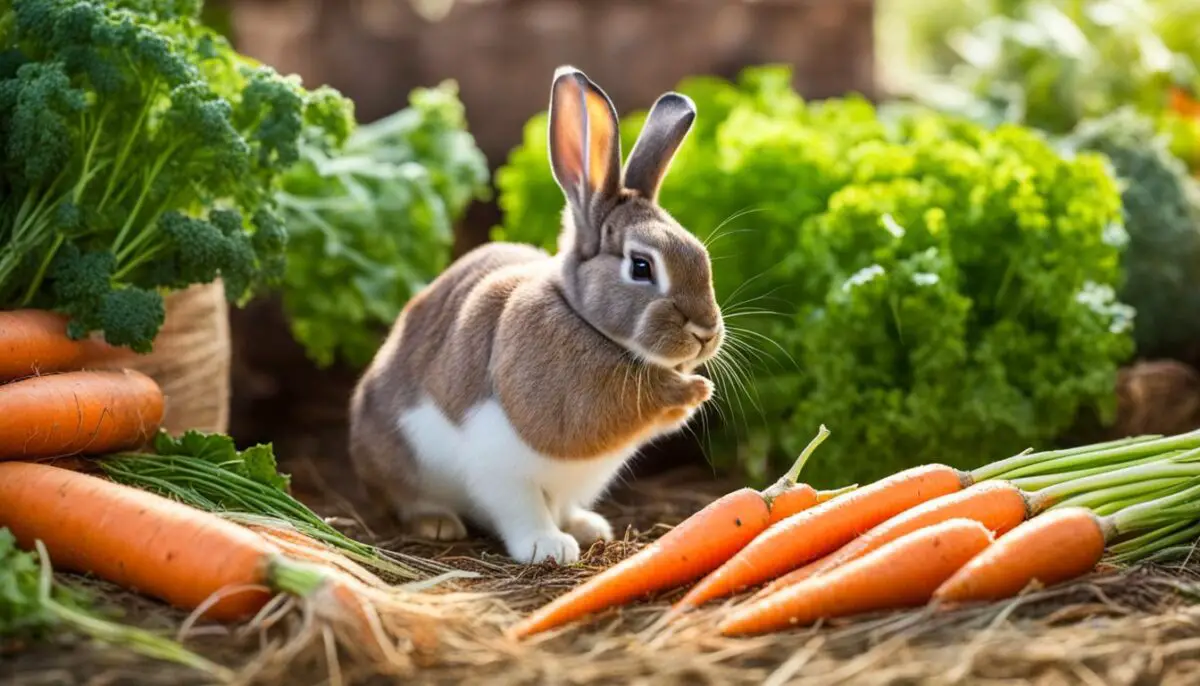
Other Vegetables to Include in Their Diet
To ensure a well-rounded diet, it is important to incorporate a variety of vegetables into your rabbit’s meals. These vegetables not only provide essential nutrients but also add variety and enrichment to their diet. When choosing vegetables for your rabbit, it is crucial to prioritize their safety and nutritional value. Here are some rabbit-safe vegetables that you can include in their daily meals:
“A varied diet ensures that your rabbit receives a wide range of essential nutrients.”
1. Leafy Greens
Leafy greens are a fantastic addition to your rabbit’s diet. They are low in calories and high in vitamins and minerals. Some examples of rabbit-safe leafy greens include:
- Kale
- Romaine lettuce
- Cilantro
2. Bell Peppers
Bell peppers are not only colorful and flavorful but also packed with vitamins and antioxidants. They make a great addition to your rabbit’s diet. However, ensure that you remove the seeds and any spicy parts of the pepper before feeding it to your rabbit.
3. Broccoli
Broccoli, when offered in small amounts, can be a healthy addition to your rabbit’s diet. It contains essential nutrients and adds some crunch to their meals. Remember to introduce broccoli gradually to avoid any digestive issues.
It is important to research each vegetable before introducing it to your rabbit’s diet. Some vegetables, such as onions, potatoes, and rhubarb, can be toxic to rabbits and should be avoided. Always consult with your veterinarian if you are unsure about a particular vegetable’s safety for your rabbit.
By incorporating these rabbit-safe vegetables into your furry friend’s diet, you can ensure that they receive a well-balanced and nutritious meal. Remember, a diverse and balanced diet is key to maintaining your rabbit’s optimal health and well-being.
Conclusion
In conclusion, rabbits can enjoy carrots as part of their diet, but it’s important to remember that moderation is key. Carrots should be viewed as occasional treats rather than a staple food for rabbits. To ensure a healthy lifestyle for your furry companion, prioritize a well-balanced diet that primarily consists of high-quality hay, fresh water, and rabbit pellets.
Consider offering carrot greens as a healthier alternative to feeding large quantities of carrots. Carrot tops are low in sugar and packed with beneficial nutrients, making them a more suitable option for your rabbit’s nutrition.
Responsible pet ownership involves being well-informed about your rabbit’s dietary needs and implementing a well-rounded approach to their feeding habits. By providing the right balance of nutrition and ensuring moderation with carrots and other treats, you can promote the overall well-being and longevity of your beloved rabbit.
FAQ
Can rabbits eat carrots?
Yes, rabbits can eat carrots. Carrots are not toxic to rabbits and can be a part of their balanced diet. However, they should be fed in moderation.
Should carrots be the primary food for rabbits?
No, carrots should not be the primary food for rabbits. A well-balanced diet for a pet rabbit consists mainly of good quality hay, fresh water, and high-fiber rabbit pellets.
Why should carrots be fed in moderation?
While carrots are safe for rabbits, they are high in sugar and should be given as occasional treats. Feeding large amounts of carrots can lead to obesity and other health issues.
Are carrot greens a healthier option for rabbits?
Yes, carrot greens are a healthier option for rabbits. They are low in sugar and rich in nutrients, making them a better alternative to large quantities of carrots.
How should I introduce carrots to my rabbit’s diet?
When introducing carrots or any new food to your rabbit’s diet, it’s important to do so gradually. Start with a small piece and monitor your rabbit’s reaction. Discontinue feeding carrots if any digestive discomfort occurs.
What other vegetables can I include in my rabbit’s diet?
Some rabbit-safe vegetables include leafy greens (e.g., kale, romaine lettuce, cilantro), bell peppers, and small amounts of broccoli. Always research before introducing new vegetables and avoid any toxic options.
What is the key to a healthy rabbit diet?
The key to a healthy rabbit diet is responsible pet ownership and a well-informed approach to their dietary needs. Provide a well-balanced diet consisting mainly of hay, fresh water, and rabbit pellets.
Source Links
- https://medium.com/@aqsa70225/can-rabbits-eat-carrots-debunking-common-myths-and-unveiling-the-truth-24c3e6a145bf
- https://historianandrew.medium.com/how-bugs-bunny-and-clark-gable-created-false-belief-that-rabbits-like-eating-carrots-65d25059b7d0
- https://www.rabbitscout.com/do-rabbits-really-like-carrots/


